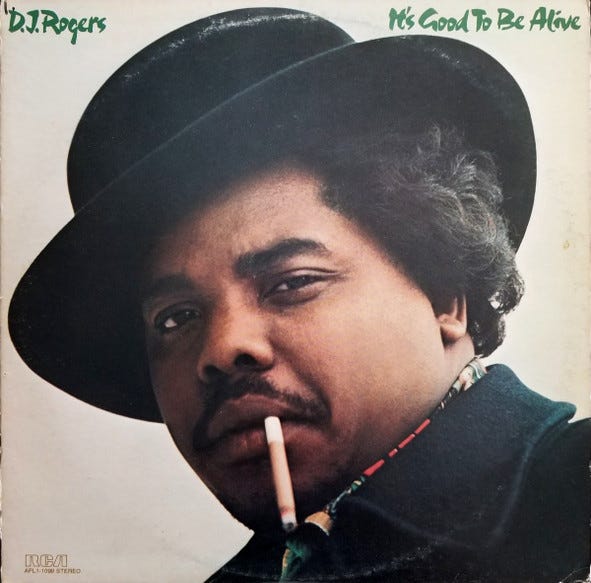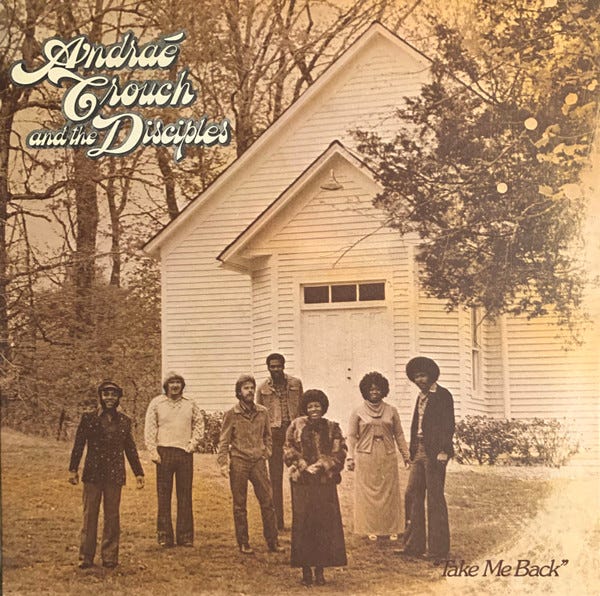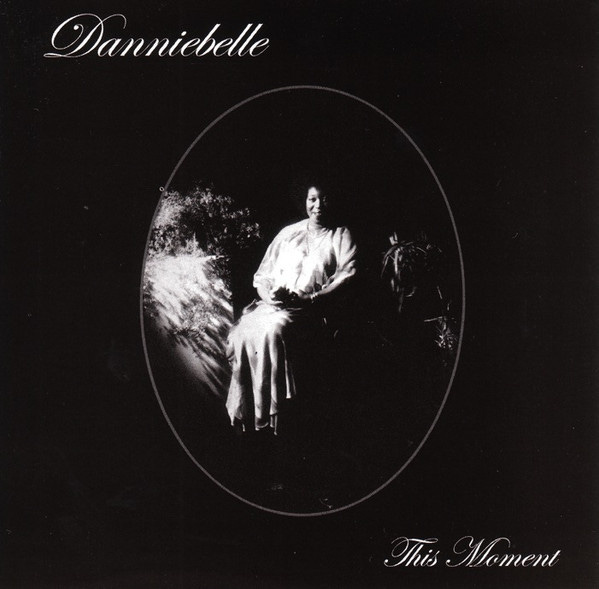1975: The West Coast Gospel Sound Explodes: D.J. Rogers, Andraé Crouch & The Disciples & Danniebelle
Three releases that raised the creative standards for contemporary gospel music and presented talent on par with artists in the mainstream.
Two weeks ago, I examined five releases from 1975, and this week’s newsletter continues that exploration.
These albums were all created by artists from the West Coast. They share interconnections with the Los Angeles gospel scene of the '60s and '70s and reflect the determination of the artists in that sector to take a specific kind of expression of the gospel message—one that was relatable and real—into the world.
D.J. Rogers—It’s Good To Be Alive—RCA Victor
1975 was an important year for gospel artists who were determined to sing songs about the totality of their lives without being run out of the church for doing so. D.J. Rogers’ voice was heard before his name was known, leading classics with Harrison Johnson and the Los Angeles Community Choir like “Jesus Saves” and “I’ve Decided to Make Jesus My Choice.” He broke ground in his own right when he began directing the Watts Community Choir, writing the majority of the songs on their groundbreaking 1970 debut, We Need More Love, a project that looked beyond the gospel market in its sound and message.
Just months after the release of We Need More Love, Rogers announced that he was leaving the group to pursue his individual musical interests, forming his Sunshine Band. By 1972, he’d landed a deal with Leon Russell and Denny Correll’s Shelter Records and his self-titled debut album followed the next year. The project revealed an artist who felt no need to choose between the gospel ethos and songs about life and love. His gospel was rife with positive thinking, self-empowerment, and a heavy groove.
1975’s It’s Good To Be Alive, however, took things to another level.
The cover image—the music minister with a cigarette dangling from his mouth—sent a message to his listeners in the gospel world that he was doing things his way. The songs themselves reinforced that message. “Hold On, Be Strong,” “It’s Good To Be Alive,” and “It’s Alright Now (I Think I’ll Make It Anyhow” all could have been gospel hits had the gospel radio format been a bit more progressive. That potential was not lost on Hezekiah Walker who modified “It’s Alright Now” into “I’ll Make It” and scored gospel gold in 1987.
Rogers dove deeper into the well of love on this effort with “Faithful to the End,” an ode to monogamy, and most famously with “Say You Love Me.” “Say You Love Me” gained traction on R&B radio—peaking at #51 on the R&B chart and even cracking Billboard’s Hot 100—but the song would end up having a greater impact in the gospel world when James Cleveland converted it to “Say You Love Him” the following year on his Grammy nominated collaboration with the Charles Fold Singers.
While Rogers was certainly positioned as an R&B artist, his deepest impact is that of a contemporary gospel innovator. In the albums that followed, he’d continue to shift the genre with songs like “Love Brought Me Back,” “He’ll Be Your All and All” and “All I Gave Him Was My Heart.” His approach to songwriting came from his own experience as a liver of life and his aspirations as a minister. He explained to David Nathan in 1976,
"It's so important to be aware of where you came from and what you're all about. It's like in one of my songs, I say 'it's alright now, I think I'll make it anyhow' because I don't want to sing the blues unless I have the answer to them. That's why I only write songs of hope and songs that deal with situations that I've lived through myself. It's like 'Say You Love Me': that's something that everyone needs to hear at some time or other. It's important to know, every night when you go to sleep, that someone somewhere really loves you."
Listen to It’s Good To Be Alive here.
Andraé Crouch & The Disciples—Take Me Back—Light Records
Another group from Southern California shaking up the gospel sound was Andraé Crouch & The Disciples. While their early releases on Light Records sported production that failed to relay the magic that occured when the group performed live, that began to change with 1973’s “Live” at Carnegie Hall. The album most succinctly relayed the ways in which Crouch brought the energy of the Jesus Movement and the Black church together, producing enduring classics like “Jesus is the Answer” and “Can’t Nobody Do Me Like Jesus.”
The Disciples' line-up on 1975’s Take Me Back remains the most memorable for fans of this supergroup. With twin sister Sandra, Danniebelle Hall, Bill Maxwell, Bili Thedford, Perry Morgan, and Fletch Wiley, the group had developed an incredible chemistry. With the help of studio musicians like Dean Parks, Larry Carlton, Larry Muhoberac, Joe Sample, David T. Walker and others, Take Me Back is a tour de force of musical genres, passing through gospel, ragtime, rock, funk, adult contemporary, and jazz.
The new Crouch biography, Soon and Very Soon: The Transformative Music and Ministry of Andraé Crouch by Robert Darden and Stephen Newby, reveals that Light Records executives told co-producer Bill Maxwell that the album would destroy Crouch’s career—but they were proven wrong when the album earned the group their first Grammy Award and topped Billboard’s gospel chart.
Take Me Back is an album that bridges the enthusiasm and innocence of The Jesus Movement and the musical exceptionalism of Crouch’s group. The songs are emblematic of a synergetic time where Christianity and the mainstream were engaging and influencing each other. Crouch said in 1975,
“I write because I’m trying to express something that’s in me and I actually hear it in that way. Music has such a big power over people. It speaks directly in their minds and hearts. That’s the whole secret about music. It heals and uplifts.”
The albums following this classic tilted the scales towards focusing on musical polish. That doesn’t at all diminish the avenues Crouch explored in the years that followed, but it does explain why, for many, this album represents the pinnacle of his creative output. Take Me Back is a perfectly balanced work that invites listeners to be a part of the music rather than an observer.
Listen to Take Me Back here.
Danniebelle Hall—This Moment—Light Records
When Danniebelle Hall was added to the line-up of Andraé Crouch and the Disciples, she came in as an artist who had already recorded an album (with her group, The Danniebelles), toured internationally, and was a seasoned songwriter and musician. Crouch wisely recognized that her talents stretched beyond what The Disciples could contain and helped arrange a solo deal for her with Light Records. He and Bill Maxwell co-produced her 1974 album, Danniebelle, which showcased the breadth of her abilities.
The follow-up release, This Moment, built upon the foundation Crouch and Maxwell had built on Danniebelle, but didn’t replicate it. On par with releases of the time like Roberta Flack’s Feel Like Makin’ Love, Joni Mitchell’s Court and Spark and Chaka Khan and Rufus’ Rags to Rufus, This Moment is breezy, contemplative, rollicking, and reverent, capturing a range of moods and sounds that refuse to be pigeonholed.
Backed by legendary session players like Leland Sklar, Joe Sample, Michael Omartian, Michael Escalante, Ernie Watts, and Fred Tackett, songs like the jazz-inflected “What Kind of Love Is This,” the soul-soaked “I”m Yours,” and the driving “I’m Gonna Go Through,” come off with such aplomb that their complexities aren’t immediately apparent—but recognizing that most of these players were in their early twenties at the time is a reminder of how much musical genius was in the world during this time and, in the case of this album, gathered in one studio.
Backing Hall vocally on the majority of the tracks are Edwin, Walter and Tramaine Hawkins with cousin Shirley Miller, all lending their dynamic, family blend to this effort that has been deeply overlooked. While artists like Hall and the Hawkins achieved recognition and success beyond the Black church, they were not given the same kind of airplay that their white counterparts like Evie, the 2nd Chapter of Acts, and Keith Green were, even though their recordings were not dissimilar and often utilized the same musicians.
While this generation of gospel listeners may not know Danniebelle’s name, they have been impacted by her work. Her 1978 recording of Dottie Rambo’s “I Go to the Rock” was the template for Whitney Houston’s recording of the song on the soundtrack for The Preacher’s Wife, now heralded as the best-selling gospel album of all time. She would also become the first black woman nominated in the Song of the Year category in the Gospel Music Association’s Dove Awards for her 1977 composition, “Ordinary People.” What drew audiences to her work was her reliability, which allowed her to make even the largest concert halls feel like an intimate exchange between friends. What might have facilitated that intimacy was her distance from the notion of superstardom. She explained to the Contra Costa Times in 1976,
“I’m not aggressive and I don’t relish the bright lights, but that kind of work is helping me to mature and develop as a human being and as a Christian.”
Read more about Danniebelle here.
Listen to This Moment here.
Before You Go
Don’t miss this incredible interview by
with my friend Bob Bailey about his 40+ year career as a CCM/gospel recording artist and legendary session singer/background vocalist for everyone from Tammy Faye Bakker to Garth Brooks. Hunter talks with Bob about his story and the reissues of his catalog I recently had the honor of co-producing. Thank you, Hunter!You can purchase the reissues at Bob’s Bandcamp!
More About 1975
5 Groups With Albums Turning 50!
God's Music Is My Life is a reader-supported publication. To receive new posts and support my work, consider becoming a free or paid subscriber.
Song of the Soul: Honeytree & Cris Williamson
God's Music Is My Life is a reader-supported publication. To receive new posts and support my work, consider becoming a free or paid subscriber.










I do have Dannibell Live in Sweden but also Andres Live in London & remember loved reading the liner notes on both. I would also look for Reba Rambo listed on either project ha ha. As always what fun it is to read your work Tim. Thank you so much 🙏
DJ Rogers is completely new to me-- love this!!